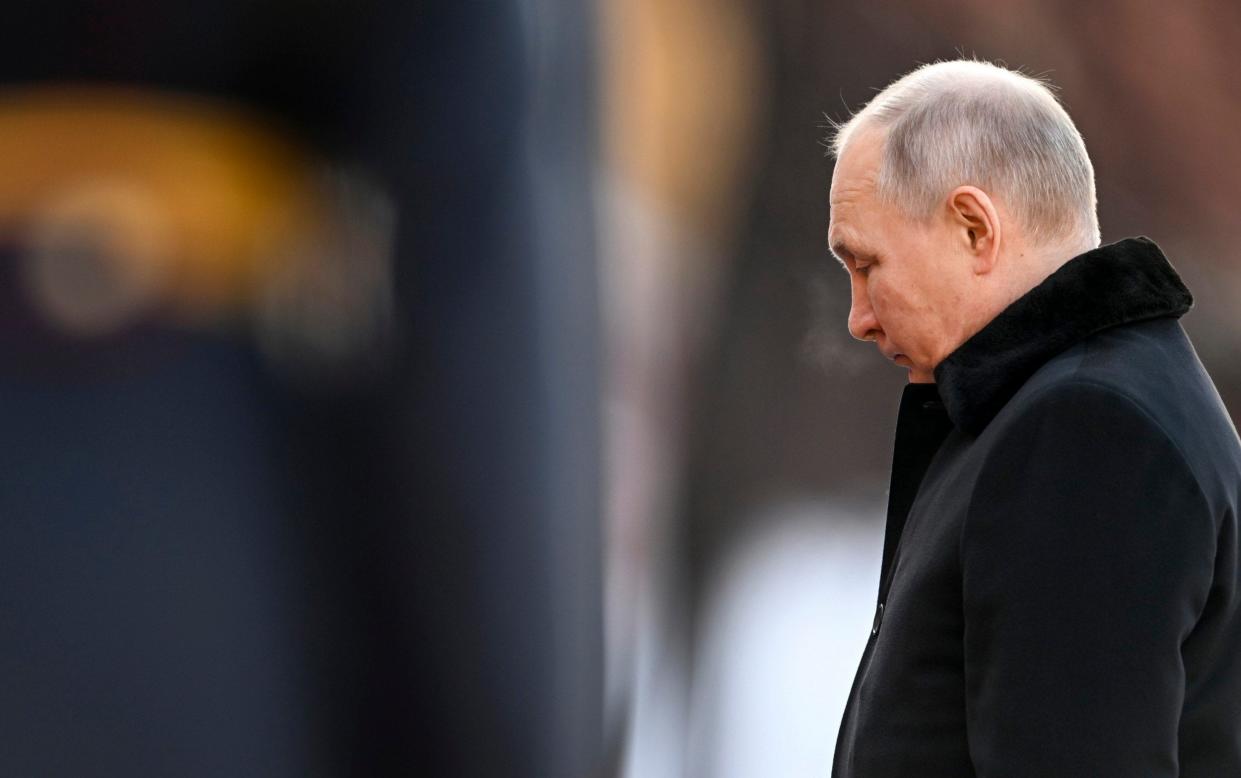Vladimir Putin keeps making the same basic mistakes

- Oops!Something went wrong.Please try again later.
It was Karl Marx who said that history repeats itself, first as tragedy, then as farce. The father of communism was right for once, and never has his saying been more appropriate than now, as Vladimir Putin’s botched invasion of Ukraine continues into its second year.
There’s been much fanfare in recent weeks about Putin launching a major new offensive to completely debilitate Ukraine. Western leaders held their breaths at the Munich Security Conference last month, wondering if Kyiv had the resources to hang on. But the Russians are already getting bogged down and the tanks are stuck. Their expected gains are not quite coming to fruition. Does that remind you of anything? More than a year since the launch of Putin’s “special military operation”, we are witnessing an eerie repetition of the initial invasion – a repeat of the bad strategies and false assumptions that have plagued the Kremlin’s war plans.
Putin’s military strategy continues to be ill-thought through, in particular displaying a poor grasp of weather. As videos emerge of Russian tanks struggling to get through the Ukrainian mud, there appears to have been little preparation for the thawing of the ground that one might expect during a spring offensive. This is just bizarre, since it is precisely what bogged down the Russians last year.
It’s also what did for another dictator in not so distant history – Adolf Hitler, during Operation Barbarossa in 1941. Heavens, there’s even a Russian word for it: Rasputitsa (a season of the year when travel on unpaved roads or across country becomes difficult). The most basic student of military strategy would know that offensive manoeuvres involving heavy tanks and jeeps do not operate well in a quagmire – and yet the Kremlin has been caught out twice.
Furthermore, the new offensive still uses ridiculous First World War tactics, which come up short against a 21st-century, well-equipped, well-trained, and highly motivated Ukrainian army. Russian tanks, with their low ground clearance, cannot withstand changes to weather. Western tanks can – the CR2 and Leopard 2 have much higher clearance.
It could be that Putin was pinning all his hopes on the restoration of soldier morale after months of long nights and bitter cold. If so, this was another miscalculation. Morale will always be higher among Ukrainian troops, who are fighting for their country’s survival – on their own territory, with the knowledge that Western tanks are coming – than among Russians, who are press-ganged to pile out of trenches and thrown into a meat grinder with rusty weapons, no training and inexperienced commanders. No army can fight and win in those conditions, and no number of Putin speeches will change these fundamental dynamics.
Perhaps the Russian tyrant is hoping to dominate the air, with spring weather clearing the skies. But that would also make it easier for Ukrainian forces to shoot down his jets, especially with the aid of Western Patriot missile systems, whose batteries can shoot down aeroplanes as well as incoming missiles and drones. We could see a repeat of the scenes above Kyiv last year: Russian jets coming down in smoke, the pilots having ejected.
Moreover, clearer skies will help Western intelligence assets which feed critical information to Ukrainian forces, allowing them to conduct strikes deep behind enemy lines using Himars. Expect more Russian HQs and logistic hubs to be hit.
Meanwhile, the Kremlin’s air intelligence gathering has recently been sabotaged by the destruction of a Beriev A-50 spy plane, worth hundreds of millions of pounds.
Putin must either be deeply troubled or badly guided. He faces the same conundrum in this major offensive as he did in the last: either he crosses his fingers and hopes the West loses its resolve, or his new conscripts die in vain, leaving their bereaved mothers to apply political pressure back home.
Ukrainian troops will dominate the battlefields this spring and summer. Russian failures will continue to repeat themselves. New weapons will be sent to Kyiv, and the determination to secure their freedom will increase. The Kremlin will search frantically for a game changer – which is why we must keep an eye out for chemical weapons.
Col Hamish de Bretton-Gordon OBE is a former commander of the 1st Royal Tank Regiment

